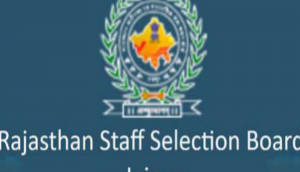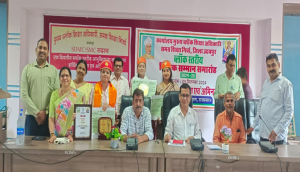
Shrimati Smriti Iraniji,
I have spent 37 years of my life in the field of higher education. The first five years were spent acquiring graduate and postgraduate degrees. Subsequently, I taught and studied further because that was the nature of my job.
Long before you began to focus on a career in television, public universities in India contributed to the growth and development of India's young, adding new knowledge, learning and ideas; training them to be enlightened citizens of a cosmopolitan world.
Also Read: Please let children choose their own streams, Smriti Irani to parents
Over the last decade, political interference has played great havoc in university affairs. Far-reaching changes have been made to systems of teaching and evaluation. The annual examination was modified by introducing internal assessments. Opaque and whimsical moderation procedures diluted standards of student evaluation. The year-end examination was thoughtlessly replaced by semesters, Four Year Degree Programme (FYUP). And now, the Choice Based Credit System (CBCS), your personal contribution to university education, has worsened matters significantly. No reviews of these ill-conceived and hastily imposed overhauls, exist, as of date.
Meanwhile, things have gone from bad to worse in the teaching community. Student enrollment numbers went up by over 50% several years ago.
This expansion was not offset by an adequate increase, either in the number of teachers or in additional infrastructure. To add insult to injury, repressive work conditions continue to be incorporated through new notifications and gazettes.
The cap imposed on the number of jobs sanctioned as a result of the OBC expansion has never been lifted. Permanent appointments have been far and few, and teachers are employed contractually as ad-hocs over several years.
The Kota suicide files: Another IIT aspirant commits suicide. 10th case this year
Instead of sorting this out and attracting talent, there is an attempt to reduce the current strength of teachers by a drastic rescheduling of teaching workload, something you call the Academic Performance Indicator (API).
Teachers with 15 to 17 periods (hours) of teaching per week (inclusive of practicals and tutorials) are now being given impossible teaching schedules ranging from 22 to 24 hours of direct lectures per week.
Those under the illusion that 15 to 17 hours is inadequate work need to understand that delivering a 55-minute lecture factors needs hours of preparatory work. Reading up on the subject and then writing out a lecture take considerable time on a daily basis. This also holds true for structuring tutorials or conducting practicals.
Over and above this, is the onus of internal assessment, where teachers correct tutorials and term exam papers for classes with student strengths varying from 61 to 150. As of now, teachers at Delhi University clock up more work hours in comparison to university teachers anywhere in the world.
Also Read: UGC changes rules for deemed to be universities; 10 things to know
Meanwhile, the UGC sends us cheery advice suggesting that each teacher should mentor 25 students and take responsibility for their emotional and mental well-being.
Mentoring takes place within tutorials and practicals where students are met in smaller, interactive groups. Mentoring is based on providing learning and skill drawn from expertise in a specific subject. No university teacher is automatically qualified to be a counsellor. Formulations of this nature, reveal total unfamiliarity with the requirements of university education.
The framers of new policies are exceedingly poor at maths. Two hours of practicals cannot be added up to make a single hour! Twenty-four hours of lectures translates into 4.8 lectures per day.At a conservative estimate, two and a half (2.5) hours preparation time is required per lecture. The average teacher will spend around 10 hours in daily preparation. Six more hours are scheduled per week for tutorials, remedial teaching and administrative work under the schedules indicated in the new UGC gazette.
This ensures that overcrowded classrooms and minimal individual attention to students remain the order of the day. Time spent on assignments, tests, evaluation and corresponding paper work is not calculated.
A 15 hour workday is not feasible.
It ensures that teachers will have no energy to pursue academic interests, lead a normal life, let alone pursue academic interests, research or develop hobbies which are indicative of positive growth indexes. Burnouts and rates of attrition will skyrocket. Clearly, this impossible work-schedule has been formulated to bring down the number of teaching posts in all universities by around 50%. This is palpably unfair to both teacher and student interest.
New promotional avenues (API points) with strange calibrations for teaching hours, lack of transparency or freedom in research, and whimsical prescriptions for publication are poised to make Indian academics and universities a laughing stock all over the world.
Successive governments have bewailed the low rankings obtained by Indian Universities on international charts. Healthy teacher student ratios, one of the primary indicators of top ranking, continue to fall drastically, due to blinkered government policies. Meanwhile, meagre funding for education, as part of the GDP and the astounding halving of financial support to the UGC, will paralyse university funding and functioning further.
You have turned a blind eye and a deaf ear to the valid grievances of teachers in prime universities. The need of the hour is to give premier universities support and restore optimal conditions of teaching and learning.
Instead, you are embarking upon funding 10 public universities and 10 private universities. Will these 20 universities be enough to educate our teeming millions, who are pushed willy-nilly into higher education because adequate schooling has never been provided? How many of India's poor and deserving will be able to afford costs, let alone have access to these new institutions?
Meanwhile, a new education policy waits in the wings, promising further shock.
As of now, the future of public university parallels that of state-run schools wherein successive governments have ensured the complete destruction of primary and secondary education.
Having finished off schooling, the state has turned its attention to our once fine public universities and Institutes of Technology, effortlessly engineering the exodus of heads of institutions and experts in various departments across the country.
Of course, part of unwritten national policy demands that distinguished persons in varied fields of expertise must be marginalised or replaced by subsequent governments. This modus operandi has been extended to higher education as well. Ordinances, rules and gazettes, are meant to set standards and provided direction. Instead, punitive regulations have been put in place, guaranteed to drain the life-blood out of vibrant centres of higher learning.
You likened the atmosphere in a premier university to Pandora's opened box in Parliament. We must point out Madam, that Pandora's boxes have been opened in every prestigious public university in our country today. Unfortunately, this is not the work of malicious gods. Governments have replaced philosophic and holistic dissemination of knowledge with "the business of education" dovetailing this through successful WTO transactions. Hope emerged last from Pandora's box, in the original myth. She renewed old promises, healed injuries and drove out pain and despair. It is to hope that all denizens of public universities, must now turn. Impending destruction can be warded off only when everyone is alert to the irretrievable loss of the greater good.
Ratna Raman
Associate Professor in English, Sri Venkateswara College
DUTA Member
Also Read: Despite controversies, 5 reasons why Smriti Irani makes for a good education minister
First published: 9 June 2016, 11:39 IST






![BJP's Kapil Mishra recreates Shankar Mahadevan’s ‘Breathless’ song to highlight Delhi pollution [WATCH] BJP's Kapil Mishra recreates Shankar Mahadevan’s ‘Breathless’ song to highlight Delhi pollution [WATCH]](https://images.catchnews.com/upload/2022/11/03/kapil-mishra_240884_300x172.png)

![Anupam Kher shares pictures of his toned body on 67th birthday [MUST SEE] Anupam Kher shares pictures of his toned body on 67th birthday [MUST SEE]](https://images.catchnews.com/upload/2022/03/07/Anupam_kher_231145_300x172.jpg)






